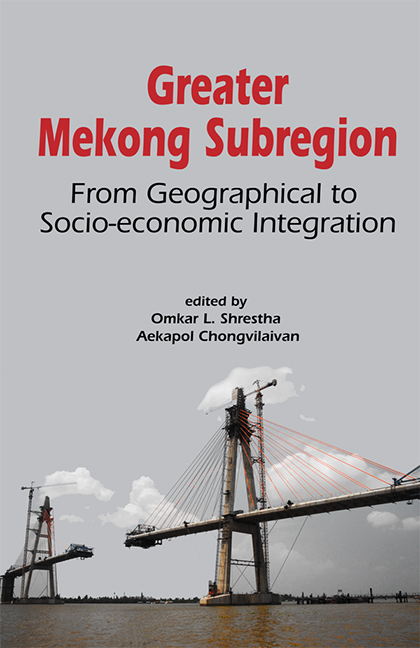Book contents
- Frontmatter
- Contents
- Preface
- List of Abbreviations
- Contributors
- 1 Greater Mekong Subregion: From Geographical Corridors to Socio-economic Corridors
- 2 Cambodia, Its Development, and Integration into the GMS: A Work in Progress
- 3 Subregional Connectivity in the Lao PDR: From Land-locked Disadvantage to Land-linked Advantage
- 4 The Economic Development of Myanmar and the Relevance of the Greater Mekong Subregion
- 5 GMS Challenges for Thailand
- 6 Deepening GMS Cooperation in a More Integrated ASEAN and East Asia
- 7 China (Yunnan)–GMS Economic Cooperation: New Development and New Problems
- 8 Trade and Investment in the Greater Mekong Subregion: Remaining Challenges and the Unfinished Policy Agenda
- 9 Enhancing Financial Cooperation among the GMS Countries
- 10 The Challenges of GMS Regional Integration: Case Study of Governance of the Logistics Industry in Thailand
- 11 Energy Sector Integration for Low-carbon Development in the GMS: Towards a Model of South-South Cooperation
- 12 Linking the Social to the Economic: Broadened Ambitions and Multiple Mitigations in New Mekong Corridors
- Index
10 - The Challenges of GMS Regional Integration: Case Study of Governance of the Logistics Industry in Thailand
Published online by Cambridge University Press: 21 October 2015
- Frontmatter
- Contents
- Preface
- List of Abbreviations
- Contributors
- 1 Greater Mekong Subregion: From Geographical Corridors to Socio-economic Corridors
- 2 Cambodia, Its Development, and Integration into the GMS: A Work in Progress
- 3 Subregional Connectivity in the Lao PDR: From Land-locked Disadvantage to Land-linked Advantage
- 4 The Economic Development of Myanmar and the Relevance of the Greater Mekong Subregion
- 5 GMS Challenges for Thailand
- 6 Deepening GMS Cooperation in a More Integrated ASEAN and East Asia
- 7 China (Yunnan)–GMS Economic Cooperation: New Development and New Problems
- 8 Trade and Investment in the Greater Mekong Subregion: Remaining Challenges and the Unfinished Policy Agenda
- 9 Enhancing Financial Cooperation among the GMS Countries
- 10 The Challenges of GMS Regional Integration: Case Study of Governance of the Logistics Industry in Thailand
- 11 Energy Sector Integration for Low-carbon Development in the GMS: Towards a Model of South-South Cooperation
- 12 Linking the Social to the Economic: Broadened Ambitions and Multiple Mitigations in New Mekong Corridors
- Index
Summary
With the initiative and assistance of the Asian Development Bank, the Greater Mekong Subregion (GMS) economic cooperation programme was established in 1992 to promote closer economic cooperation among the GMS countries, which include Cambodia, the Lao People's Democratic Republic, Myanmar, Thailand, Yunnan province of China, and Vietnam. The GMS countries so far have a strong political will to foster closer cooperation through intergovernmental collaborations in such areas as agriculture, energy, telecommunications, tourism, transport infrastructure, and the like. However, different country backgrounds, objectives, and intentions among the GMS countries tend to create political impediments to cooperation and emerging innovative development.
In recent years, governance has emerged as a discipline for fostering development and cooperation because good governance theoretically and practically will deliver effective public service and create economic efficiency and equity for long-term and sustainable development of an economy. However, governance issues are likely to be much more complicated at an international level. To show that governance is an important element when discussing regional economic activities, this study therefore provides case studies in the logistics industry to demonstrate that governance is an important mechanism that should be promoted not only at a national level, but also at the regional level when dealing with development issues in the GMS.
The cross-border governance issues in the logistics industry become increasingly important as ASEAN moves towards the ASEAN Economic Community (AEC) in 2015 because the industry will be related to regional public goods provision which require effective national road infrastructure and coherent coordination of transport infrastructure policies across the GMS countries’ borders. In tackling the problems that might occur, improved governance and a favourable policy and regulatory framework, along with capable institutions, will be the key factors for successful regional economic development and integration.
To investigate the governance issues in the logistics industry in Thailand and its importance at the regional level, this chapter explores the inefficient pricing framework, as well as weak regulatory and law enforcement in the Thai transport industry, and bottlenecks in cross-border transport in the GMS. Specifically, the chapter is divided into six sections. The next section gives an overview of governance in Thailand and other GMS countries. The section that follows discusses the challenges of the domestic transport market in Thailand.
- Type
- Chapter
- Information
- Greater Mekong SubregionFrom Geographical to Socio-economic Integration, pp. 172 - 215Publisher: ISEAS–Yusof Ishak InstitutePrint publication year: 2013

